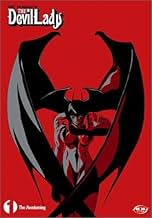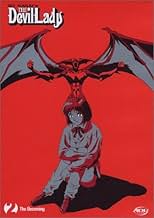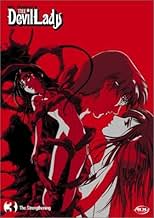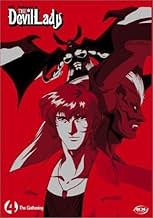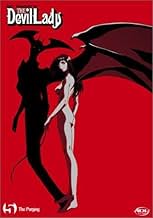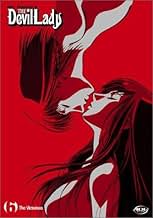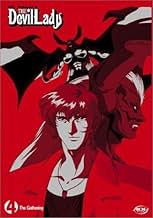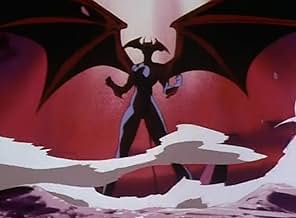A supermodel is attacked by a monster which brings her inner devil out. However, she doesn't let go of her humanity, so a secret government agency asks her to help them fight the demonic for... Read allA supermodel is attacked by a monster which brings her inner devil out. However, she doesn't let go of her humanity, so a secret government agency asks her to help them fight the demonic forces that secretly threaten Japan and the world.A supermodel is attacked by a monster which brings her inner devil out. However, she doesn't let go of her humanity, so a secret government agency asks her to help them fight the demonic forces that secretly threaten Japan and the world.
Browse episodes
Storyline
Did you know
- TriviaBased on a manga series by Go Nagai that ran from 1997 to 2000 in Japan.
- ConnectionsReferenced in AniMat's Crazy Cartoon Cast: Everything is Delayed (2020)
- SoundtracksLose Heart
Performed by Legolgel
Featured review
With action, adventure, demons, horror, mysteries, philosophy, and mounds upon mounds of gore, Devil Lady has all the right ingredients for an exciting and intriguing anime series. Unfortunately, the materials were added out of order, whipped with a dirty whisk, frozen at the wrong temperature, baked for too long, and dropped on the floor, resulting in something that's definitely doesn't help in making Go Nagai's name any more revered. Starting out as an interesting series with a somewhat alluring story, Devil Lady has gotten progressively worse, hitting its third volume with the crushing knowledge that the previously `alluring story' has gotten absolutely nowhere and accomplished nothing. Containing four wholly trite and hackneyed episodes, the third disc further continues the air of dullness with its rather blasé packaging. Trying to embody the image of horror as much as possible, the disc is enclosed by a tri-colored cover that looks like it was smuggled from the cutting room of Nightmare Campus or Demon High School Porn Club Naughty Jungle Teacher. Inside the shiny disc, however, is where all the non-magic happens. As extras, ADV has thoughtfully added the textless opening and ending sequences, which are so special that they're included on every single volume in the series. There is one brief extra that is worthwhile, however, and this is few slices of original artwork included in a minute gallery. These four shots show gorgeously drawn portraits of certain characters in a variety of mediums, and are truly amazing.
Normally, the number of extras on a disc doesn't matter, as their purpose is to serve as just that-extras, and occasionally an added incentive for purchasing an already capital-worthy DVD. It is a pity, then, that the extras for the third volume of Devil Lady are so scant, as it wouldn't hurt to offer viewers a bribe to even watch the show. The original concept of the show started out rather interestingly, featuring Jun who is a model that occasionally turns into a beast. She works for an offshoot of the government that controls the epidemic of Beasts that are living amongst humans, and conducts research on what makes humans turn into Beasts and what not. Sadly, by episode ten, this is still the overriding plot of the show, settling into a comfortable groove of being a very patterned, Beast-o'-the-Day series. This in itself wouldn't be as bad if it weren't for the fact that not only are the episodes redundant, they are also incredibly drawn out and slow. An entire twenty-five moments are devoted solely to a story that could have been done with much more fire and pizzazz in half the time. The main cause of this is the pacing, making it seem like the writers tried too hard to make the show deep and profound. Each revelation made by the characters or conclusion drawn by viewers is repeated over and over again, echoed by other characters repeatedly, just to make sure the paper-thin story was filed away into the minds of the audience. This was done even for the obvious, making it exasperating to listen to the characters grope for time by reinstating for the third time what just happened in the previous scene.
This isn't to say that the story was devoid of good qualities, however. In fact, the one very impressive part about the way the episodes were written was the use of symbolism and foreshadowing. An example is the first episode, where the weather pattern and the color of the sky were used to parallel both the reoccurring events in the plot, as well as hint at what was going to happen. The palette used was later tied into the Beast's past, too, giving even more meaning to the symbols mentioned earlier. Scattered with instances such as these, the scenes were able to give themselves a much more thought-provoking air without the distraction of a babbling cast to reinforce any imagery used.
Although scenes that use the aforementioned images, like rain and skies red with fire smoke, are wonderfully drawn with vibrant backgrounds, the rest of the art in the series leaves much to be desired. Crafted in Go Nagai's infamous style, the scenes are littered in gore, creepy images, nudity, and sexual innuendo. In fact, the last episode contains a strong dose of implied quasi-incest, tentacle rape, misogyny-but this should come as no surprise to viewers familiar with many of Nagai's other works. What brings down the use of gore and nudity is not the content, but the boorish way in which it is portrayed. Nudity is roughly drawn, blood is carelessly made to appear and spray in unscientific ways-crude remains the only word that can be used to describe it. The characters themselves don't look bad at all, but with all the unclean foreground art and random elements and bodily fluids clustered on them, it only adds to the atmosphere of uncouthness.
The rough and unpolished feeling exuded by the artwork also transfers itself onto the animation, which is mediocre at best. The movements aren't particularly graceful, though they serve their purpose adequately. A bit disappointing, though, is the way effects were animated, like fire and wind. The colors used were bland and the animation choppy, resulting in something that looks more like a low-budget hentai production than anything else. As with the gripe about the artwork, the amount of bodily fluids dripping amok in the series also contribute to the cheap-hentai look, the shoddy way they were done serving only to taint what could have potentially been a good suspense or action series.
Though your eyes may get wary at the low quality look of the series, your ears will get an equal opportunity to indulge in mediocrity as well. Although the acting for both language tracks is done properly and by the books, no passion is thrown behind the voices. The difference lies between good actors who feel their characters' triumphs and pains, and readers who simply read their lines to gather paychecks-much like the difference between an impassioned pianist who weaves stories on a keyboard and a piano player who hits the notes as they are printed on the page. The one exception is the Japanese actress for Jun, played by the amazing Iwao Junko who is able to make her voice burn when she's angry, and cry when she feels pain. To credit the English dub, though, it must be said that the script is rather impressive. Although ADV altered a few of the lines and violated the silent respites in the original script, the lines were translated mostly faithfully.
It can't be said that Devil Lady is a bad series-it just doesn't live up to its potential. Rather than explore the philosophical points grazed in the dialogue, such as the rights of humanity and its co-inhabitants, the scenes dwell on the wrong parts of the story and make the story clunky and rough. Impersonating the uneven pacing of the script, the visual aspects of the story contribute to the raw feeling of the show, stripping it of any grace or imagery and then forcing it back later when this loss is recognized. Fans of Go Nagai will be thrilled at the nudity and bloodshed and repressed hentai urges, but such things otherwise bring down an already mediocre show. Devil Lady has an interesting story behind it, but unless the potential can be acted upon, not watching these episodes will be nothing to lament.
Normally, the number of extras on a disc doesn't matter, as their purpose is to serve as just that-extras, and occasionally an added incentive for purchasing an already capital-worthy DVD. It is a pity, then, that the extras for the third volume of Devil Lady are so scant, as it wouldn't hurt to offer viewers a bribe to even watch the show. The original concept of the show started out rather interestingly, featuring Jun who is a model that occasionally turns into a beast. She works for an offshoot of the government that controls the epidemic of Beasts that are living amongst humans, and conducts research on what makes humans turn into Beasts and what not. Sadly, by episode ten, this is still the overriding plot of the show, settling into a comfortable groove of being a very patterned, Beast-o'-the-Day series. This in itself wouldn't be as bad if it weren't for the fact that not only are the episodes redundant, they are also incredibly drawn out and slow. An entire twenty-five moments are devoted solely to a story that could have been done with much more fire and pizzazz in half the time. The main cause of this is the pacing, making it seem like the writers tried too hard to make the show deep and profound. Each revelation made by the characters or conclusion drawn by viewers is repeated over and over again, echoed by other characters repeatedly, just to make sure the paper-thin story was filed away into the minds of the audience. This was done even for the obvious, making it exasperating to listen to the characters grope for time by reinstating for the third time what just happened in the previous scene.
This isn't to say that the story was devoid of good qualities, however. In fact, the one very impressive part about the way the episodes were written was the use of symbolism and foreshadowing. An example is the first episode, where the weather pattern and the color of the sky were used to parallel both the reoccurring events in the plot, as well as hint at what was going to happen. The palette used was later tied into the Beast's past, too, giving even more meaning to the symbols mentioned earlier. Scattered with instances such as these, the scenes were able to give themselves a much more thought-provoking air without the distraction of a babbling cast to reinforce any imagery used.
Although scenes that use the aforementioned images, like rain and skies red with fire smoke, are wonderfully drawn with vibrant backgrounds, the rest of the art in the series leaves much to be desired. Crafted in Go Nagai's infamous style, the scenes are littered in gore, creepy images, nudity, and sexual innuendo. In fact, the last episode contains a strong dose of implied quasi-incest, tentacle rape, misogyny-but this should come as no surprise to viewers familiar with many of Nagai's other works. What brings down the use of gore and nudity is not the content, but the boorish way in which it is portrayed. Nudity is roughly drawn, blood is carelessly made to appear and spray in unscientific ways-crude remains the only word that can be used to describe it. The characters themselves don't look bad at all, but with all the unclean foreground art and random elements and bodily fluids clustered on them, it only adds to the atmosphere of uncouthness.
The rough and unpolished feeling exuded by the artwork also transfers itself onto the animation, which is mediocre at best. The movements aren't particularly graceful, though they serve their purpose adequately. A bit disappointing, though, is the way effects were animated, like fire and wind. The colors used were bland and the animation choppy, resulting in something that looks more like a low-budget hentai production than anything else. As with the gripe about the artwork, the amount of bodily fluids dripping amok in the series also contribute to the cheap-hentai look, the shoddy way they were done serving only to taint what could have potentially been a good suspense or action series.
Though your eyes may get wary at the low quality look of the series, your ears will get an equal opportunity to indulge in mediocrity as well. Although the acting for both language tracks is done properly and by the books, no passion is thrown behind the voices. The difference lies between good actors who feel their characters' triumphs and pains, and readers who simply read their lines to gather paychecks-much like the difference between an impassioned pianist who weaves stories on a keyboard and a piano player who hits the notes as they are printed on the page. The one exception is the Japanese actress for Jun, played by the amazing Iwao Junko who is able to make her voice burn when she's angry, and cry when she feels pain. To credit the English dub, though, it must be said that the script is rather impressive. Although ADV altered a few of the lines and violated the silent respites in the original script, the lines were translated mostly faithfully.
It can't be said that Devil Lady is a bad series-it just doesn't live up to its potential. Rather than explore the philosophical points grazed in the dialogue, such as the rights of humanity and its co-inhabitants, the scenes dwell on the wrong parts of the story and make the story clunky and rough. Impersonating the uneven pacing of the script, the visual aspects of the story contribute to the raw feeling of the show, stripping it of any grace or imagery and then forcing it back later when this loss is recognized. Fans of Go Nagai will be thrilled at the nudity and bloodshed and repressed hentai urges, but such things otherwise bring down an already mediocre show. Devil Lady has an interesting story behind it, but unless the potential can be acted upon, not watching these episodes will be nothing to lament.
- GavinNelson178
- May 14, 2004
- Permalink
- How many seasons does Devilman Lady have?Powered by Alexa
Details
- Runtime30 minutes
- Color
- Aspect ratio
- 1.33 : 1
Contribute to this page
Suggest an edit or add missing content




